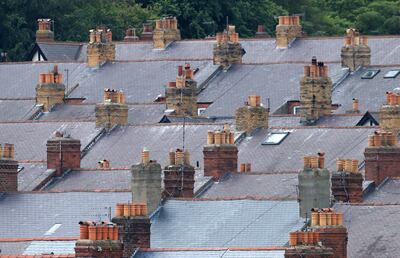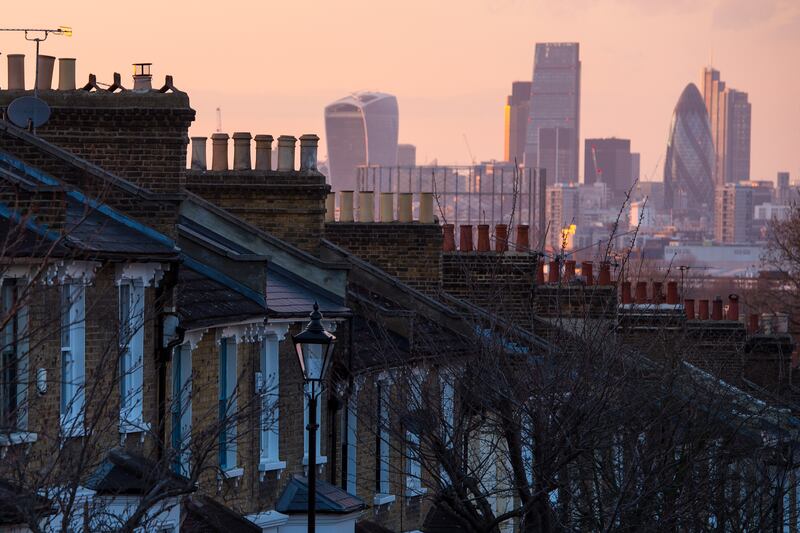When Britain’s central bankers notched up yet another interest rate rise on Thursday, they added further woes to first-time homeowners like myself who bought nearly two years ago.
With interest rates now at four per cent and my mortgage bill set to go up by hundreds every month, it’s hard not to feel a touch of buyer's regret over my post-pandemic purchase.
Before my partner and I received the keys to our London home in June 2021 our timing could hardly be described as impeccable, coming on the back of the UK's lockdowns.
Buyers who had saved deposits were snapping up properties as they raced to take advantage of then-chancellor Rishi Sunak’s stamp duty cut, an experiment to boost the market which expired at the end of the summer.
After running the usual gauntlet of failed bids and last-minute deal gazumping, we settled on a two-bedroomed Victorian-era home in south-east London that was near the forthcoming Crossrail, a futuristic multibillion-pound rail project offering access to the centre of the city and beyond.
For more than a decade, we had been in the London rental market and suffered the usual horror stories, from mice-infested flats to emotionally volatile flatmates. We'd seen it all.
This purchase would free us from the capital's treacherous house shares and secure our financial future.
But as we exchanged contracts it was hard to shake the feeling that we were about to fail the first test of home ownership: don’t buy at the top of the market.
My hometown of Dublin was particularly badly hit by the property crash in 2008, as banks lent freely and home valuations went into free fall. Some unfortunate buyers have only recently emerged out of negative equity, more than a decade after the crash.
When we bought, consumer prices were already ticking up from near zero to 2.5 per cent and central banks, which had cut interest rates to deal with the pandemic, were now under pressure to do something about it.
And now, we are among the estimated one million homeowners who will this year see their fixed-term rates shoot up after the Bank of England's action to tackle inflation.
Hindsight is a wonderful thing but had we known where the inflation headwinds would take us, our decision may well have been different.

The case for renting
Those who extol the virtues of buying over renting say that paying rent is dead money. In some ways, they are right. Owning a home is a great way of forced saving and increasing house prices are a boon for owners.
But any gains on paper are quite often just that. Few who brag about their house price mention the eye-watering cost of maintaining their property, which can over time run to a small fortune.
Property taxes, such as stamp duty, are yet another disincentive, growing proportionally as you climb the British property ladder to bigger, more expensive homes.
In many ways you have simply replaced your landlord with a lender. One who this time can't help you out when things go south.
Data seems to bear out that owning a home has rarely been more expensive.
The Consumer Prices Index with Housing (CPIH), which measures inflation plus the cost of owning, maintaining and living in one’s own home, reached its highest point in decades in December, surpassing the previous high in late-1990.
As it stands, the Bank of England’s base rate is expected to reach a peak of 4.5 per cent before slowly falling back down as inflation subsides.
Britain’s high-street banks are now only offering mortgages to first-time buyers at 5.5 per cent, more than twice the level needed in 2020.
While still low by historical standards, that adds more than £1,000 ($1,250) per month to the cost of a mortgage on a house worth £550,000 ($675,00). That's nearly a quarter of a million pounds more on top of the cost of a typical 25-year mortgage.
Like many who took out a home loan during the pandemic, the dramatic increase in rates will see my partner and I pay out an additional £500 every month.
Victorian values
I must confess that our finances have rarely been in a worse state, owing to the mounting costs of home ownership.
What most people don’t often mention is the laughably poor state of Britain’s housing stock, much of which dates to the 19th century.
The 1930s saw the beginning of migration away from London’s core and into the suburbs, as upwardly mobile families such as my grandparents shunned cramped Victorian terraces and bought homes on spacious estates.
Much of the Victorian housing stock that was left behind — damp, squalid and sometimes damaged by bombing — fell into disrepair before being knocked down in many cases and turned into flats.
Now fashionable again, these homes command a premium on the property market but are often beset with issues.
This was something that we soon learnt first-hand as our house began to show every day of its 130 years as soon as we moved in.
As winter began to set in, leaks and damp patches appeared when it rained. Windows needed replacing. The boiler, of an indeterminate age, broke down in sub-zero temperatures, needing immediate repair.
And it's not just the older houses that have problems.
Stunted house prices
A combination of high house prices and elevated borrowing costs has sent a chill through the market, sending mortgage applications tumbling and house prices are following.
Our email boxes are still full of estate agents' latest instructions, with guide prices looking more and more optimistic by the day. Latest estimates show that house prices will continue to fall this year, with some banks conservatively predicting a 10 per cent drop.
Still I console myself with the fact that things could be worse, much worse. Liz Truss's ideological mission to turn the UK into a low-tax, low-regulation economy sent the financial markets into a spin and UK gilts into the stratosphere last year.
Mortgage lenders were soon predicting rates of up to 7 per cent, a death knell for the housing market which would have undoubtedly led to a massive wave of repossessions.
Admittedly the appeal of renting in London is also at a low ebb. Rents have shot up in the post-pandemic years, although this appears to be a global phenomenon.
However, I still get a pang of jealousy when I meet renting friends who are still living close to the city centre, who can walk home from gigs and enjoy the undeniable buzz of London's inner boroughs.
Footloose and fancy free, they can simply move across the country with just a month's if they are offered a new job, or simply get sick of city life.
What's more they usually don't wake up in the middle of the night, worrying that their boiler is going to break down.





